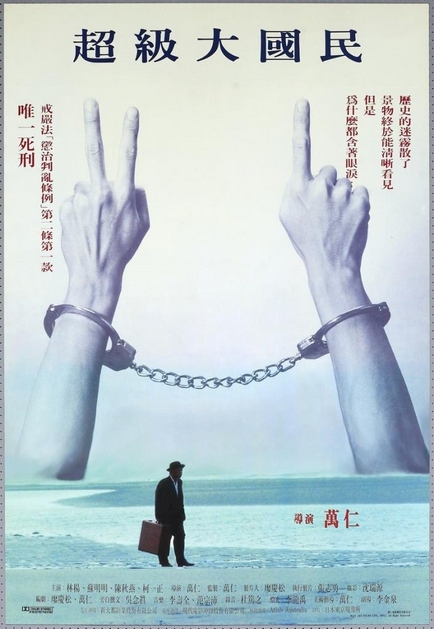Super Citizen Ko (超級大國民)
1995, 121 mins
directed and written by Taiwanese director Wan Jen (萬仁), born 1950 in Taipei, leading filmmaker of Taiwan’s New Wave of Cinema era
Languages: Mandarin Chinese, Japanese, Taiwanese (shown with English subtitles)
The film takes place against the backdrop of Taiwan’s fanatical anti-communist White Terror era between 1947 and 1987, a period aimed at weeding out Communist spies. The story is told in a retrospective manner by the titular Mr. Ko, a leftist sympathizer who spent 16 years in jail for his membership of a political study group, and another 18 years alone in a secliusive nursery home, racked with guilt over selling out his best friend Mr. Chen. Now – after 34 years - an old man, he is moved into action by a sudden nightmare.
The film is what the Germans call a Trauerarbeit: a labour born of unassuageable sadness. Ko (Lin Yang) is wrecked physically by prison tortures and destroyed mentally by a mixture of guilt, fear and incomprehension.
In old age he stumbles through a Taipei he no longer recognises, trying to make sense of the past and to make amends to his late friend Chen who was summarily shot for “subversive” activities – they are shown in the 5os in B&W flashbacks. A picture of the period is pieced together as Ko visits former colleagues, one of whom is half-nutty (claiming the KMT planted an anti-political thought device in his brain). The officer who arrested Ko, now owner of a noodle stand, admits they often hauled in the wrong people.
Despite anonymous threats to his life, Ko travels to the south, where a colleague produces a list of executed prisoners. Ko manages to track down Chen’s grave, one of hundreds hidden away in a hillside bamboo grove, paying tribute at long last by lighting candles everywhere and speaking to the dead--"Those of you who possessed...selfless love were abandoned here"--is immensely moving.
Parallel to the horrifying political story (larded with facts and figures), the movie fills in the background of Ko’s family life, from the tragic fate of his wife (the excellent Chen Yen-chiu) to the resentment his only surviving daughter, with whom Ko now has to live, holds against the old man for his earlier selfishness.
The story is in essence a political melodrama, but Wan turns it into a dignified elegy for dead ideals and hushed-up crimes against the heart and mind.
Especially notable are the flashbacks involving the mother, processed in tones midway between color and B&W to evoke half-faded memories of the period. For Director Wan Jen, known for his sarcastic humour („The Taste of Apple“ 1983), the somber tone is quite new and, at two hours during the wjhole film, unrelieved.
Featuring poetic interior monologues composed by veteran writer and Hou Hsiao-hsien collaborator Wu Nien-jen, this recently (2017) restored masterpiece is at once a cry for transitional justice, a meditation on the changing Taipei cityscape, and an exploration of cinematic language in a multimedia world.
"Super Citizen Ko is a moving, strong, intelligent recreation of a part of history integral to understanding Taiwan." (David Overbey, Toronto Film Festival)
See more:
Understanding Taiwan through Wan Jen's films [ Ministry of Culture, Taiwan ]
Super Citizen Ko [ TimeOut London ]
Super Citizen Ko [ Variety Magazine ]
Super Citizen Ko [ Chicagoreader ]
Text source and photocredit: Vienna Center for Taiwan Studies




